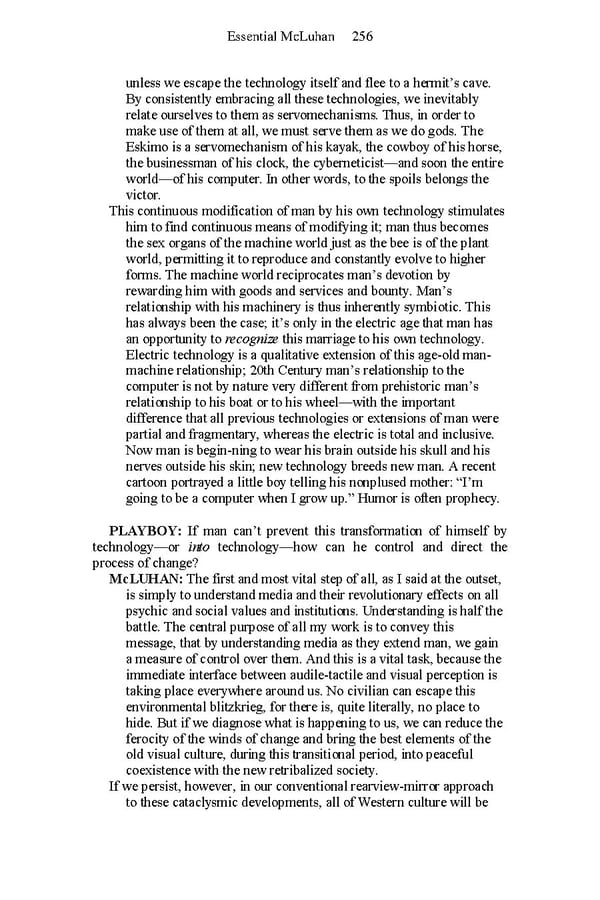Essential McLuhan 256 unless we escape the technology itself and flee to a hermit’s cave. By consistently embracing all these technologies, we inevitably relate ourselves to them as servomechanisms. Thus, in order to make use of them at all, we must serve them as we do gods. The Eskimo is a servomechanism of his kayak, the cowboy of his horse, the businessman of his clock, the cyberneticist—and soon the entire world—of his computer. In other words, to the spoils belongs the victor. This continuous modification of man by his own technology stimulates him to find continuous means of modifying it; man thus becomes the sex organs of the machine world just as the bee is of the plant world, permitting it to reproduce and constantly evolve to higher forms. The machine world reciprocates man’s devotion by rewarding him with goods and services and bounty. Man’s relationship with his machinery is thus inherently symbiotic. This has always been the case; it’s only in the electric age that man has an opportunity to recognize this marriage to his own technology. Electric technology is a qualitative extension of this age-old man- machine relationship; 20th Century man’s relationship to the computer is not by nature very different from prehistoric man’s relationship to his boat or to his wheel—with the important difference that all previous technologies or extensions of man were partial and fragmentary, whereas the electric is total and inclusive. Now man is begin-ning to wear his brain outside his skull and his nerves outside his skin; new technology breeds new man. A recent cartoon portrayed a little boy telling his nonplused mother: “I’m going to be a computer when I grow up.” Humor is often prophecy. PLAYBOY: If man can’t prevent this transformation of himself by technology—or into technology—how can he control and direct the process of change? McLUHAN: The first and most vital step of all, as I said at the outset, is simply to understand media and their revolutionary effects on all psychic and social values and institutions. Understanding is half the battle. The central purpose of all my work is to convey this message, that by understanding media as they extend man, we gain a measure of control over them. And this is a vital task, because the immediate interface between audile-tactile and visual perception is taking place everywhere around us. No civilian can escape this environmental blitzkrieg, for there is, quite literally, no place to hide. But if we diagnose what is happening to us, we can reduce the ferocity of the winds of change and bring the best elements of the old visual culture, during this transitional period, into peaceful coexistence with the new retribalized society. If we persist, however, in our conventional rearview-mirror approach to these cataclysmic developments, all of Western culture will be
 Essential McLuhan Page 262 Page 264
Essential McLuhan Page 262 Page 264